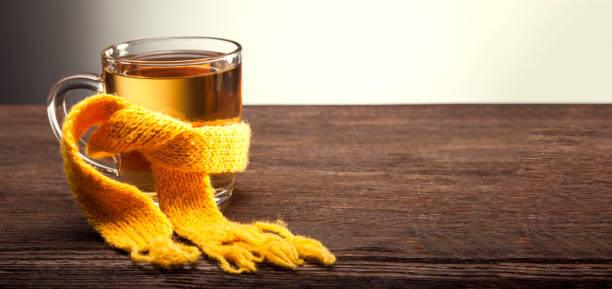
There are only four seasons; flu season does not have to be one of them. Flu viruses commonly circulates during the winter months when people are inside more, getting less sunlight, and dealing with the stress and food indulgences associated with the winter holidays. These factors make us more vulnerable to both encountering the virus and more susceptible to getting sick. Every year about 5-9% of the population contract the flu. There are many things people can do to reduce the likelihood of becoming sick.
In order to get the flu, you must come in direct contact with it. According to the Center for Disease Control (CDC), flu is spread from person to person by droplets when the infected person coughs, talks, or sneezes. The droplets can travel up to 6 feet. People are contagious from about 1 day before they become symptomatic and remain contagious for approximately 3-5 days. The most important thing you can do to protect yourself and others from the flu is stay home when you are sick.
 Contact with the Flu: The first line of defense is do not encounter the flu. Stay away from people who are sick. If you are an employer, make a strong policy that sick people are to stay home when they are sick. The flu can also be spread by touching an object with the flu virus on it. Flu germs live on surface for about 8 hours.
Contact with the Flu: The first line of defense is do not encounter the flu. Stay away from people who are sick. If you are an employer, make a strong policy that sick people are to stay home when they are sick. The flu can also be spread by touching an object with the flu virus on it. Flu germs live on surface for about 8 hours.
 Washing your hands frequently under warm water is important. Make it a practice to wash your hands with soap and water for at least 20 seconds upon entering and leaving a new environment, before eating, and after using the bathroom. Hand sanitizers are not as effective as proper hand washing.
Washing your hands frequently under warm water is important. Make it a practice to wash your hands with soap and water for at least 20 seconds upon entering and leaving a new environment, before eating, and after using the bathroom. Hand sanitizers are not as effective as proper hand washing.
Avoid touching your face and mouth. If you are in direct contact with a someone with the flu, you may consider using a respiratory mask. The mask functions as a barrier to prevent the flu droplets from entering your body.
Create an inhospitable environment: Flu germs live on surface for about 8 hours, so it is important to sanitize those surfaces. Vinegar will kill off the flu virus. Make a surface spray using 2 tablespoons of vinegar and 16 ounces of water and a few drops of the following essential oils (oil of oregano, thieves, or tea tree oil) and add to a spray bottle. Everyday spray doorknobs, light switches, phones, remote controls, counter tops, steering wheel of your car, radio dials, and seatbelt buckles to disinfect surfaces that are likely to be touched.
- Cover your food and drinks when in public places. If you drink out of a mug or a glass or water while at work, you might want to put a lid or a coaster on top so other people’s germs can’t land in your drink.
- Antibacterial wipes simply transport the bacteria to another location; they spread viruses instead of killing them. The best practice is to use a surface spray and wipe down the area with a paper towel and then discard the paper towel.
- Open your windows for 20-30 minutes daily to air out your environment. In winter, we typically have our windows closed and we are sitting with trapped, recirculating air. Make it a point to air out your space daily.
- Flu viruses can not live in high temperatures. Make sure your dishwasher is at the highest temperature setting during the winter months. You can use your dishwasher to clean and sanitize children’s toys and pacifiers by running them through a high heat cycle with no detergent, just vinegar.
- Use your dryer at high temperatures to kill germs on throw pillows, little blankets, winter coats, or stuffed animals your child might sleep with. Instead of washing these items daily, you can throw those in the dryer for 30 minutes at high temperatures to kill any viruses that have landed on the surface
- Using a humidifier can help create a more inhospitable environment for the flu. Researchers at Columbia University discovered that flu epidemics nearly always followed a drop-in air humidity. Flu viruses circulate less effectively in humid environments.
 Bolster your immune system: Our immune system is designed to fight off pathogens and attack the things we encounter in the world that make us sick. The following are easy ways to keep your immune system functioning optimally during the winter.
Bolster your immune system: Our immune system is designed to fight off pathogens and attack the things we encounter in the world that make us sick. The following are easy ways to keep your immune system functioning optimally during the winter.
Go outside! Even when the weather is cold, our bodies benefit from being outside. When we are outside in the sun, our bodies are exposed to vitamin D which helps with immune functioning as well as calcium absorption.
 Sleep is important to keep your immune system at peak level. Maintaining a regular sleep schedule that gives you 7-9 hours of good sleep daily is important for staying healthy. Getting run down makes us less able to fight off viruses.
Sleep is important to keep your immune system at peak level. Maintaining a regular sleep schedule that gives you 7-9 hours of good sleep daily is important for staying healthy. Getting run down makes us less able to fight off viruses.
When we experience stress, our bodies mobilize for attack. The stimulation of our nervous system over long periods of time can deplete our bodies and lower our ability for our immune system to do what it needs to. Daily mediation, walking outside, keep a gratitude journal, avoid things that get you agitated or stressed.
Drink plenty of water. Water helps our body remove waste and toxins and transports nutrients throughout our body. If drinking water is hard try substituting plain water for herbal teas, lemon water, or broths. Avoid sodas or sugar filled drinks, because sugar will suppress your natural immune function. At the first sign of a cold or the flu, stop consuming all sugars, refined carbohydrates, and alcohol.
 Exercise is important for keeping the immune system functioning at its peak. During exercise, blood flow become elevates and this promotes the process of pushing toxins out of the body. Elevated blood circulation also promotes antibodies and white blood cell production which are important for fighting off infections. As little as 20 minutes of walking five days a week can help your immune system perform at its best.
Exercise is important for keeping the immune system functioning at its peak. During exercise, blood flow become elevates and this promotes the process of pushing toxins out of the body. Elevated blood circulation also promotes antibodies and white blood cell production which are important for fighting off infections. As little as 20 minutes of walking five days a week can help your immune system perform at its best.
A well-balanced diet is critical for keeping the immune system functioning properly. Eating a diet rich in nutrient-dense foods stimulates your immune system and improve your body’s ability to fight illness. Eating six to eight servings of fruits and vegetables daily will support a healthy immune functioning. For more information on specific superfoods that improve your immune system please read Foods to Boost the Immune System.



Join the Conversation